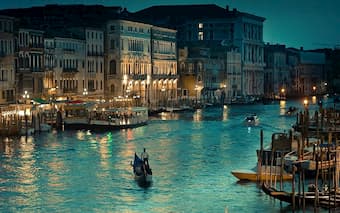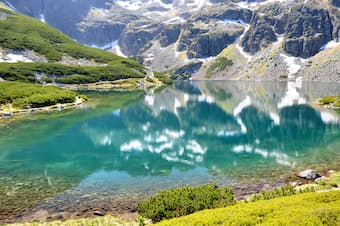
New York City
Composers, especially from the Romantic period onward, have sought to evoke places, real or imagined, in their music – from the awe-inspiring grandeur of the Alps in Liszt‘s Vallée d’Obermann to Debussy‘s shimmering pagodas, the heady sounds, scents and scenes of Spain in Albeniz’s Iberia, or the exuberant play of fountains in Ravel’s Jeux d’Eau.
Water provides much inspiration too – the rolling ocean or playful mountain streams – while winter landscapes are evoked in exquisite stillness, the delicate patter of snowflakes or the soft tread of footsteps in the fresh snow……
Here is a selection of my favourite piano music evoking landscapes and places.
Cyril Scott: Lotus Land
Described as “the English Debussy”, Cyril Scott wrote atmospheric, impressionistic music and ‘Lotus Land’ is a particularly fine example of his style – a dreamy, sensuous piece whose pungent, unusual tonality, perfumed harmonies and languid glissandi evoke the drowsy humid heat of the Orient.
Cyril Scott: 2 Pieces, Op. 47: No. 1. Lotus Land (Lydia Maria Bader, piano)
Samuel Barber: Excursions
The first published solo piano piece by Samuel Barber, ‘Excursions’ takes player and listener on a musical American road trip, from the fast-moving bustle of the big city as portrayed in the Boogie-Woogie first movement to the relaxed blues of the Deep South in the second movement, an uplifting American folksong in the third movement, and an exuberant, foot-stamping barn dance in fourth movement.
Samuel Barber: Excursions, Op. 20 (Joanna MacGregor, piano)

Venice at Night
Frédéric Chopin: Barcarolle
Surely one of Chopin’s greatest works, the Barcarolle (literally a “boat song”) intoxicates and thrills with its vivid narrative, depicting a boat on the swelling ocean. Here we feel not only the movement of the sea, the roll and pitch of the boat, but also the breath of the sea breeze. It’s one of the finest, most atmospheric evocations of the sea in music.
Frédéric Chopin: Barcarolle, Op. 60 (Idil Biret, piano)
Claude Debussy: Preludes
Many of Debussy’s Preludes depict landscapes and places, most famously the mythical sunken cathedral which rises dramatically from the ocean, bells tolling, monks chanting and organ playing. Des pas sur la neige (Footsteps in the Snow), meanwhile, evokes, in a relatively few notes and phrases, the muffled stillness after a heavy snowfall. La Puerta del Vino, inspired by a postcard of the Moorish ‘Gate of Wine’ by the Alhambra in Granada, Andalucia, is replete with Spanish rhythms and strummed guitar effects.
Claude Debussy: Préludes, Book 1 – No. 6: Des pas sur la neige (François-Joël Thiollier, piano)
Claude Debussy: Préludes, Book 1 – No. 10: La cathedrale engloutie (François-Joël Thiollier, piano)
Claude Debussy: Préludes, Book 2 – No. 3: La Puerta del Vino (François-Joël Thiollier, piano)

Tatra Mountains
Karol Szymanowski: Mazurka No. 1
Polish composer Karol Szymanowski was inspired to write his Op. 50 Mazurkas after visiting the town of Zakopane in the Tatra mountains, a place he eventually settled in permanently. These pieces come from the same tradition of Polish folk music as Chopin’s Mazurkas, and the first of the set is particularly evocative, opening with what might be a rustic flute or fiddle theme – perhaps suggesting a shepherd’s pipe or poignant local folksong.
Karol Szymanowski: 20 Mazurkas, Op. 50 – No. 1. Sostenuto. Molto rubato (Anna Szałucka, piano)
Peter Maxwell Davies: Farewell to Stromness
From the Tatra Mountains in Poland to the remote Orkney islands of Scotland, another piece inspired by haunting local folk idioms and a simple swaying melody over a walking bass line. The piece was actually composed as a protest against a proposed uranium mine on the island, which would have had a significant impact on the local landscape.
Peter Maxwell Davies: The Yellow Cake Revue: Piano Interludes: Farewell to Stromness (Yuanfan Yang, piano)
Felix Mendelssohn: ‘Venetian Gondola Song’ Op 19, No. 6
One of Mendelssohn’s greatest Songs Without Words, this piece is familiar to piano students (I first learnt it when I was about 10!). Venice, at night, and possibly in winter time, is portrayed in this melancholy barcarolle whose lyrical melody is supported by a gently rocking bass line. Near the end, a dead bell can be heard tolling from a campanile across the lagoon……
Felix Mendelssohn: Lied ohne Worte (Song without Words), Book 1, Op. 19: No. 6 in G Minor, Op. 19, No. 6, “Venezianisches Gondellied” (Péter Nagy, piano)
